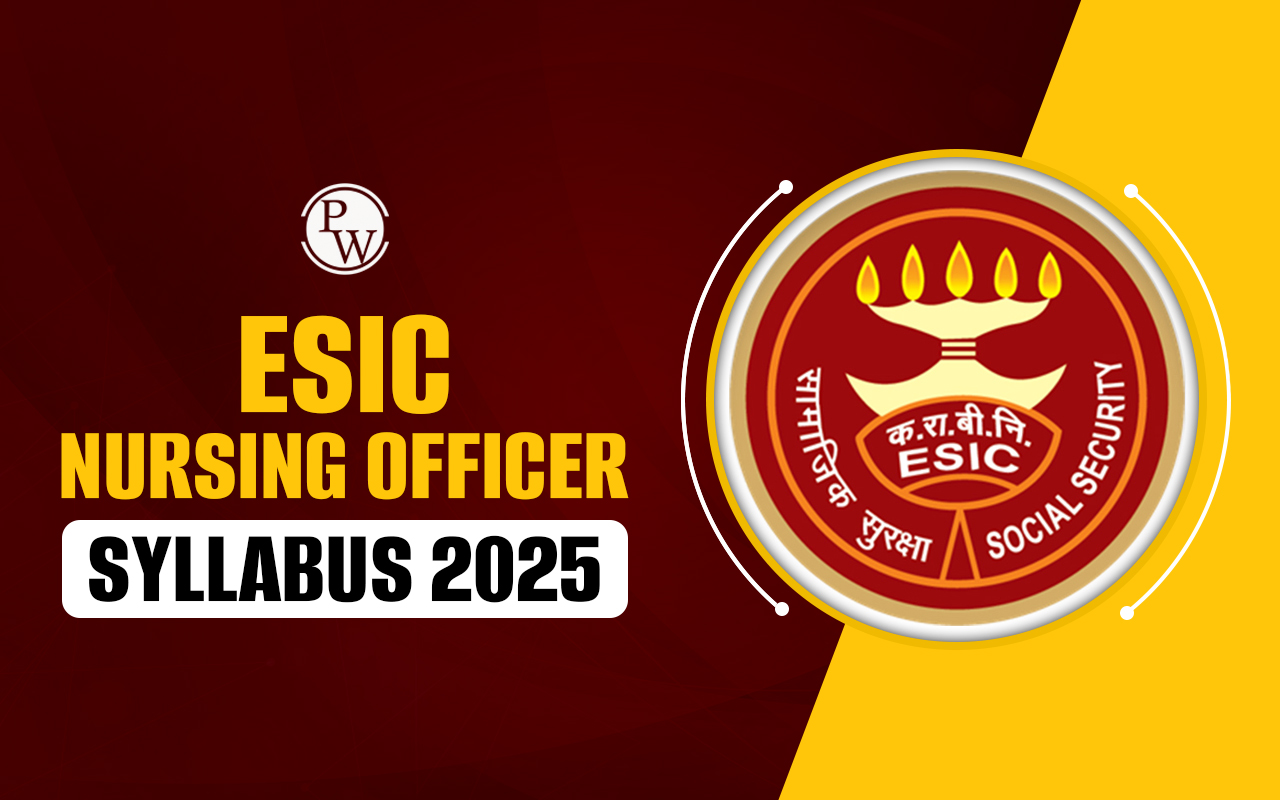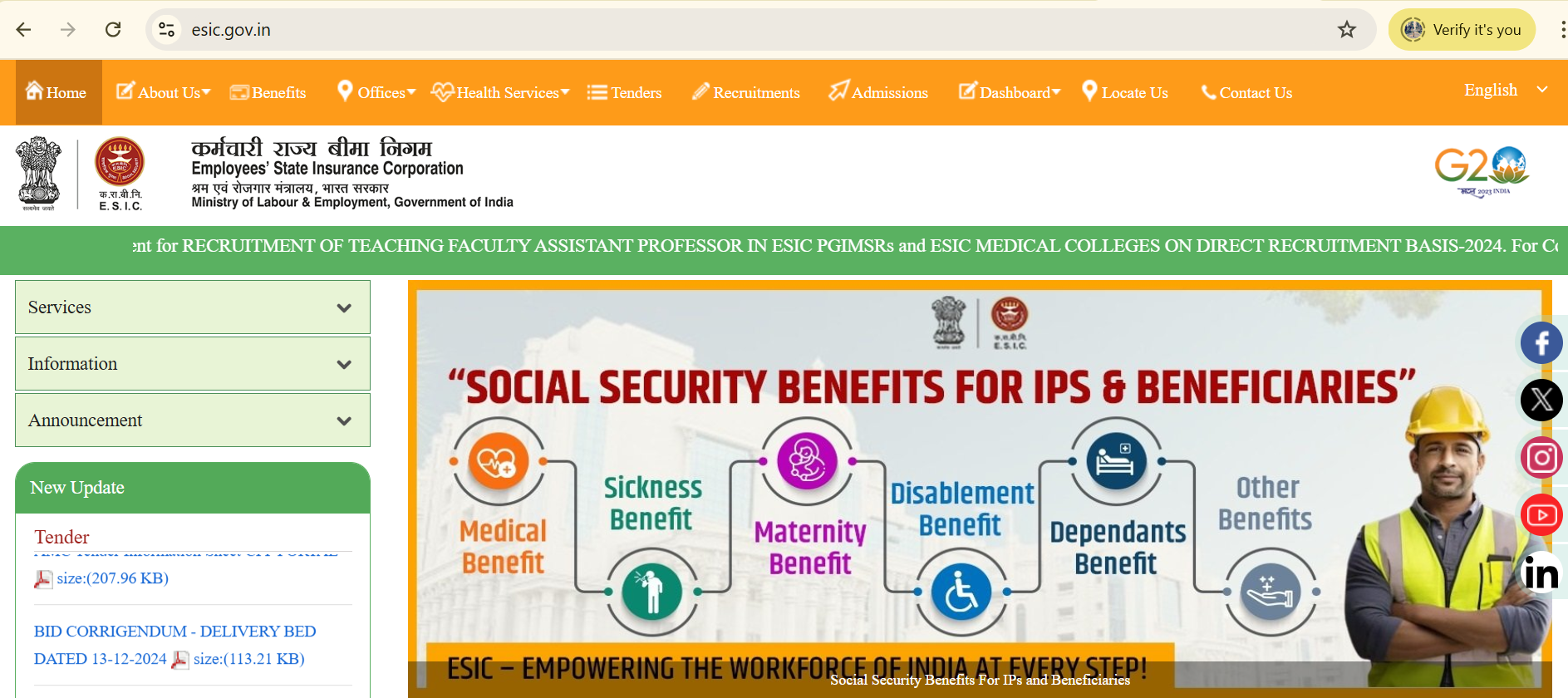
ESIC Nursing Officer Syllabus 2025: The ESIC Nursing Officer Syllabus 2025 outlines the key topics and sub-topics essential for candidates preparing for the upcoming recruitment exam. The syllabus covers a wide range of subjects, including medical-surgical nursing, maternal and child health, pharmacology, community health, and nursing management. The exam follows an objective-type multiple-choice format with 150 questions, awarding a total of 300 marks. The ESIC Nursing Officer Recruitment aims to recruit qualified nursing professionals into healthcare services provided to insured individuals. Effective preparation strategies, such as mastering clinical skills, focusing on research methodologies, and regular revision, are essential for success. Additionally, candidates should stay updated with the anticipated important dates, including the notification release and exam schedule.

| Exam Detail | Specification |
|---|---|
| Total Marks | 300 |
| Number of Questions | 150 |
| Duration | 2 hours |
| Exam Type | Objective-type multiple-choice questions |
| Marking Scheme | Each question carries equal weightage |
| Negative Marking | 1/3 mark deduction for each incorrect answer |
| Medium of Examination | English |
| Topic | Sub-Topics |
|---|---|
| Fundamentals of Nursing | Basic nursing principles, patient care techniques, and nursing ethics |
| Community Health Nursing | Community health assessment, intervention strategies, public health promotion |
| Maternal and Child Health Nursing | Pregnancy care, childbirth, postpartum care, child health management |
| Medical-Surgical Nursing | Nursing care for common medical and surgical conditions, patient management |
| Pathophysiology | Understanding disease processes and mechanisms of illness |
| Pharmacology | Drug classifications, actions, side effects, and nursing responsibilities related to medications |
| Management of Common Diseases | Diagnosis, treatment, and nursing care for prevalent diseases |
| Psychiatric Nursing | Mental health nursing, psychiatric care, managing mental illnesses |
| Mental Health Concepts and Practices | Overview of mental health disorders, coping mechanisms, and therapeutic interventions |
| Therapeutic Communication Techniques | Communication skills in nursing, building rapport with patients, conflict resolution |
| Health Education and Communication Skills | Strategies for educating patients, communication skills for health promotion, and behavior change |
| Techniques for Effective Patient Communication | Communication methods for different patient needs, ensuring clarity and understanding |
| Health Education Strategies for Community Health | Community-wide health education programs, promoting healthy lifestyles, disease prevention |
| Nursing Management | Nursing leadership principles, team management, decision-making skills |
| Principles of Management in Nursing | Effective leadership, time management, resource allocation in nursing environments |
| Leadership and Team Management Skills | Collaboration, conflict resolution, and motivational strategies in nursing teams |
| Nursing Research and Statistics | Research methodology, statistical analysis in nursing, applying research in practice |
| Basic Research Methodologies | Qualitative and quantitative research, data collection methods |
| Understanding Statistical Data in Nursing Practice | Interpretation of statistical findings in clinical settings |
| Obstetrics and Gynaecological Nursing | Care for expectant mothers, childbirth, postnatal care, managing gynecological disorders |
| Care During Pregnancy, Childbirth, and Postpartum | Prenatal care, labor management, postpartum recovery |
| Gynaecological Disorders and Their Management | Management of common gynecological conditions, diagnostic approaches |
| Community Health Nursing | Epidemiology, health promotion, and intervention strategies in communities |
| Epidemiology and Public Health Principles | Disease transmission, prevention strategies, health policies |
| Community Assessment and Intervention Strategies | Assessing community health needs, designing public health interventions |
| Anatomy and Physiology | Human body structure, organs, and systems; physiological functions |
| Human Body Systems and Functions | The circulatory, respiratory, digestive, and other body systems |
| Anatomical Terminology and Physiological Processes | Understanding anatomical terms, processes like circulation, respiration, digestion, and excretion |
| Microbiology | Pathogenic microorganisms, infection prevention, microbiological techniques |
| Microorganisms Relevant to Health Care | Bacteria, viruses, fungi, and their impact on human health |
| Infection Control Practices | Infection prevention, sterilization, hand hygiene, PPE use |
| Nutrition and Dietetics | Nutritional science, dietary needs, and therapeutic diets |
| Nutritional Requirements Across Different Life Stages | Nutrition needs for infants, children, adults, elderly |
| Dietary Management in Various Health Conditions | Nutritional management of diseases like diabetes, hypertension, obesity |
| Biochemistry | Study of biochemical processes in the human body, metabolic pathways |
| Basic Biochemical Processes in Human Health | Enzyme activity, metabolism, energy production in cells |
| Metabolism and Its Relevance to Nursing Practice | Role of metabolism in health and disease, importance for nursing interventions |
ESIC Nursing Officer Recruitment Preparation Strategies play a vital role in acing the exam. By thoroughly understanding the ESIC Nursing Officer Syllabus 2025 , practicing mock tests, and staying updated on current affairs, candidates can optimize their preparation for success. To effectively prepare for the ESIC Nursing Officer examination, candidates should consider the following strategies:
ESIC Nursing Officer Syllabus 2025 Important Dates are crucial for candidates planning their preparation. While the official dates are yet to be confirmed, it's important to stay updated with notifications from ESIC for accurate details. Below is a table with the anticipated dates for the recruitment process:
| Event | Expected Date |
|---|---|
| Notification Release Date | Early March 2025 |
| Application Start Date | Early March 2025 |
| Application End Date | Late March 2025 |
| Exam Date | Mid 2025 |
| Result Announcement | Within a month after the exam |
Also Check : ESIC Nursing Officer Recruitment 2025 Dates
